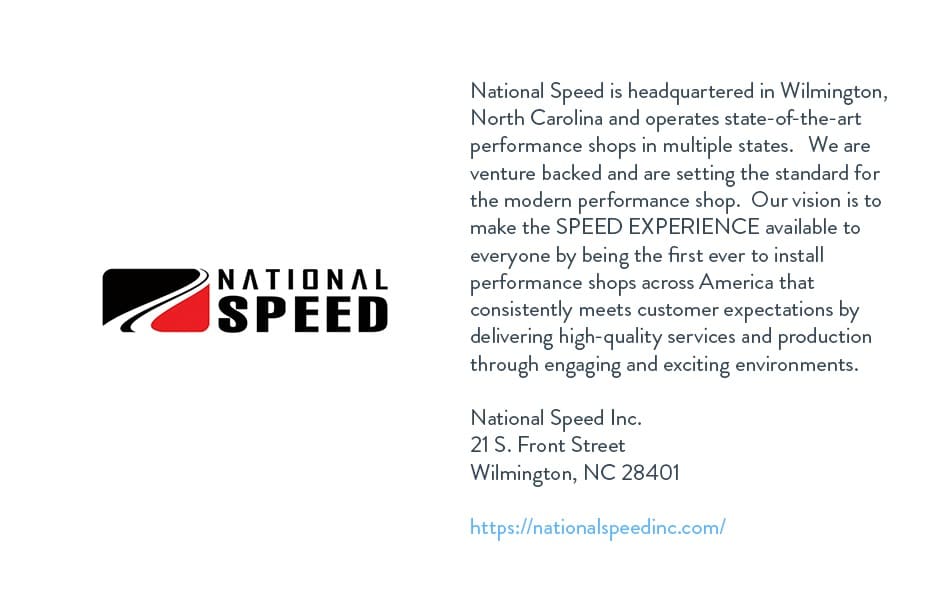Spotlight on National Speed
We’re excited to introduce another valued Employer Partner of The Honor Foundation and an Alumni who is now part of their family.
These are companies and organizations who have hired men and women from our program and/or who have generously given us their time, resources and connections in an effort to help build a stronger network for our Fellows after service — a community post community.
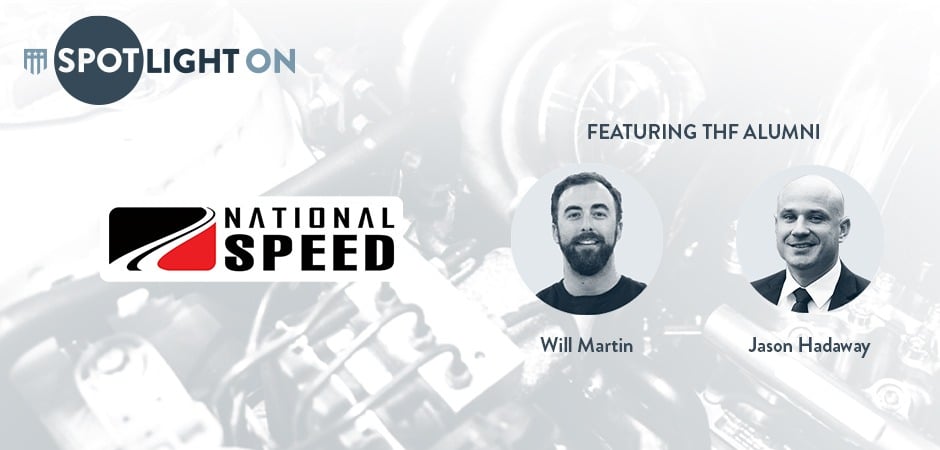
Q1 What advice do you have for those who are experiencing transition?
Will Martin (WM): First and foremost, be PATIENT with yourself throughout the transition process – easier said than done, I know. Think about things you ARE and ARE NOT looking for in terms of “fit” in your next company/organization (Do you want to lead or be led? Are you seeking a Team or singleton organization? Do you want pre-existing structure or do you want more autonomy and the opportunity to build from scratch? Where do you want to live? Do you want to travel? Are you seeking variety in daily schedule and problem-sets, or do you want predictability?). Thinking through these questions helped to bring clarity to the unknowns and ambiguity of the transition process. If the compensation structure/salary is in the ballpark to support you and your family, I would focus on your “WHY” and growth potential in prospective companies. With that said, you need to make sure that you aren’t looking past the role for which you are interviewing.
Separately, my biggest takeaway from the interview process is that it will ultimately fall on YOU to connect the dots between the prospective company’s challenges/needs. Nine times out of ten, the person interviewing you will not have the common background or experiences to bridge the private sector and military worlds. Think hard about and come prepared to articulate how your past experiences and skill sets make you a qualified candidate and a valuable addition to the prospective company. Do your research beforehand and ask questions during the interview process to understand how you can best help that company succeed. For example, most interviewers are not going to be able to extrapolate the parallels between managing difficult Partner Force leadership/personalities and dealing with dissatisfied Customers in a retail environment. I think it is a great approach at the end of an interview to ask the Interviewer, what concerns they have about you as a candidate and/or what they see will be your biggest challenge with stepping into that position. What that gives you, is a last window of opportunity 1) to illustrate how you have dealt with a similar situation, quelling their remaining concerns or 2) to own your professional/technical gaps (that is perfectly OK), while providing them with past scenarios where you have been thrown into and had to navigate unfamiliar situations/tasks. This affords you the opening to demonstrate your ability to adapt, problem-solve, and overcome to successfully meet a defined end-state. You have all the tools; you just need to understand how to translate them to illustrate your true value.
Jason Hadaway (JH): Be humble, be professional at all times, be PATIENT, and be genuine. The workforce is starving for people with the soft skills that are beaten into us as service members. Bringing those skills to the table puts you ahead of your competition from the start of the interview process. EVERYONE is learning when they are starting a new position or even the same position, but with a new company. These people have to learn new systems, new processes, and new people. So, RELAX when thinking your skills do not apply to a new industry or career choice. Most importantly do not get discouraged when you fail to acquire the role or exact company you hope for. The right opportunity and Team will present themselves and it will feel natural. The most important characteristic of the right “fit” was the connections I was making during the process.
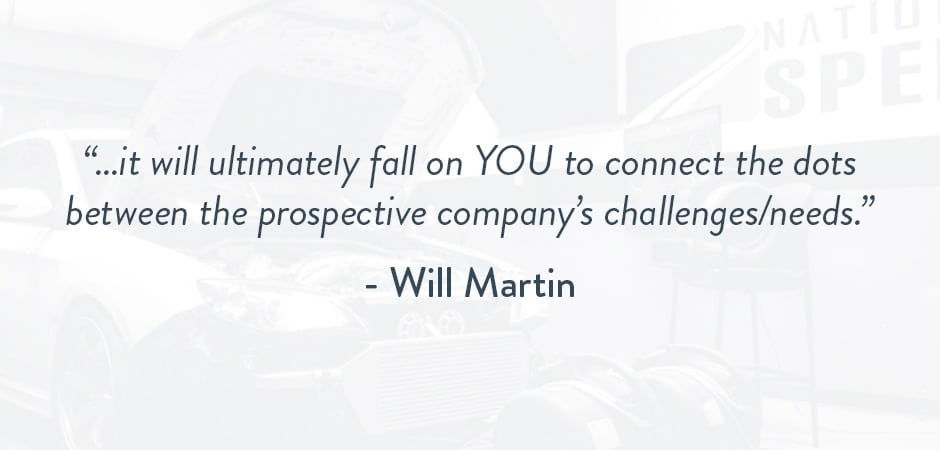
Q2 What experience shaped who you are?
WM: While my collective military experiences influenced much of who I am today, there was one major inflection point that sticks out and is what ultimately led me to pursue a career in the military. Following a High-School football game in Alexandria, VA on November 3rd, 2001, I visited the Pentagon with my parents to see firsthand the crash site of the hijacked American Airlines Flight 77. Speechless and overlooking the destruction from September 11th, 2001 from the west side hill, that moment served as the catalyst that propelled me to a career of military service in the SEAL Teams, for which I am forever grateful. I took away from that experience and my time in service the importance and power of PURPOSE and PERSPECTIVE. My biggest concern with making the transition was finding a comparable sense of purpose outside of the military, but I made that one of priorities in navigating the job search process. Consequently, I’m happy to say that it’s served me well.
JH: As a Veteran and prior Marine Raider, the many experiences that shaped me were all probably similar experiences to the audience. Exposure to strong leaders and timeless mentors. Shared struggles and successes with my peers, and losses that are still difficult to justify have shaped my understanding of people and the importance of my investment to our Team. Since transition, my exposure to excellent mentors continues to increase as I strive to surround myself and learn from those with new ideas and differing perspectives. The civilian workforce is diverse and unique from the military due to a higher risk of failure, but also higher risk for reward. Should you fail, you look for a new team and work elsewhere. Should you work hard and apply the skills and experiences you have shared in the military, you will experience more growth and promotions at a rate your company chooses. Time in grade has no value on the outside!
Q3 What is your favorite interview question?
WM: “What concerns or qualification gaps do you think you would have with stepping into this position?” This gives me insight into the candidate’s understanding of the position and their level of self-awareness. Hiring Managers are often fine with qualification gaps (I had a handful of my own when I was interviewing), but more importantly, they are looking at whether the candidate has the humility and grit to autonomously self-assess and self-correct. You are both thinking it, so own it! Use that opportunity to illustrate other scenarios where you’ve volunteered or been required to step into uncharted territory (outside of your comfort zone) and how you addressed perceived capability gaps to achieve success.
JH: My favorite interview question to ask aspiring National Speed team members completely revolves around their ability to work well with others. “Do you think you will fit in with our team, and how do you plan to ensure that happens?” I care 100x more about a person’s ability to work closely and under stress with the rest of the Team than I do about their skill level in comparison with each individual on the Team. I want to know if the individual can take a difficult situation on the chin and continue to be optimistic and think clearly. When working on close Teams, the same rules apply as in the military. Your demeanor and professionalism impact everyone around you and their ability to have a joyful and productive day.
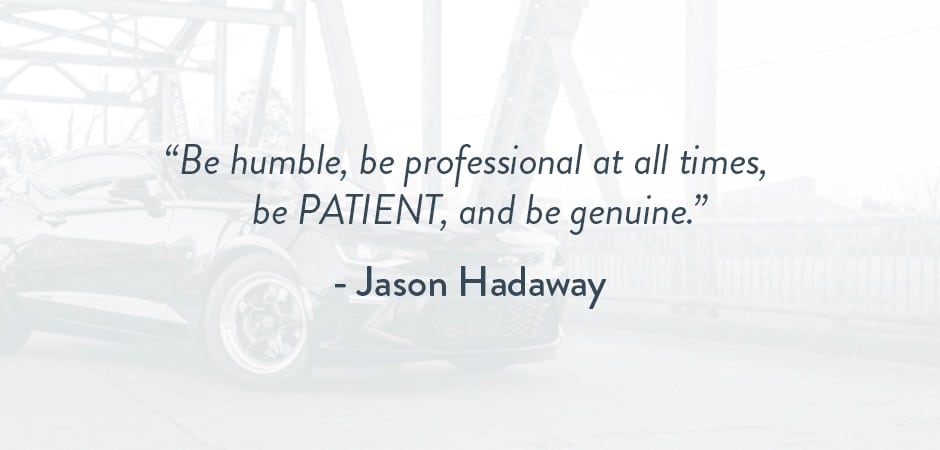
Q4 What similarities did you find between your role at National Speed and your previous experience in the SOF community?
WM: The core tenets that I’ve found transcend and drive success across both experiences are cross-organizational communication, accountability, adaptability, divergent thinking, and collaborative problem-solving. Much of my deployment experience was in leadership positions in underdeveloped areas of operational responsibility and resource constrained environments. While the severity of consequences and jargon may be different in a private sector startup/small business, there are more similarities than differences between the two worlds. As a SEAL Platoon Commander, I often applied organization, structure, course of action analysis and development, and decisive action to bring calm to chaos. My role as National Speed’s VP of Operations is no different, as I’m heavily focused on driving solutions and improvements pertaining to People, Processes, Systems, Planning, and Execution. SOF personnel are well postured to pursue post-military careers in startups and smaller companies like National Speed, because where others see obstacles, we see opportunity. We love the challenge of complex problems, we seek to understand the tactical and strategic implications of potential solutions, and we tackle it head-on to make things better for the mission and our teammates.
JH: Soft skills matter. Every interaction holds weight. You are being considered and judged for your ability for promotion and future responsibilities of the company. Your network and those who you continue to surround yourself with in a workspace is vital to your personal growth and success in a career.
Q5 What makes the culture at your company special?
WM: Like many other organizations, our culture is founded around a set of Core Values and is ultimately our “true north” that we lean on to screen, select, and measure performance of National Speed teammates – Believer, Driven, Professional, Trustworthy, and Winner. To change the automotive performance industry for the better, National Speed is focused on addressing many of the stigmas that have historically plagued the industry. Consequently, National Speed has fostered a culture founded on PROFESSIONAL and transparent communication amongst our team and with our customers, uncompromising integrity (TRUSTWORTHY) – doing the right thing no matter what, and a genuine care for our team members and customers inside and outside of work. We BELIEVE that every problem has a solution, and we seek innovation across our entire organization because there is always a better way. Our Team is comprised of professionals who are DRIVEN by the opportunity to solve problems that others deem insurmountable. Our leadership makes it a point to frequently engage with our team members on the front lines to gain a ground-truth perspective on the daily challenges that they face, so we can make tomorrow better than yesterday. We make a concerted effort to ensure every team member has a voice to provide constructive feedback and drive innovation across the entire organization. When we miss the mark, we own it, and aggressively address the issue to make it right. In summary, what makes our culture special is that we maintain an offensive posture to self-assess and drive improvements to make work and life better for our people – teammates and customers alike.
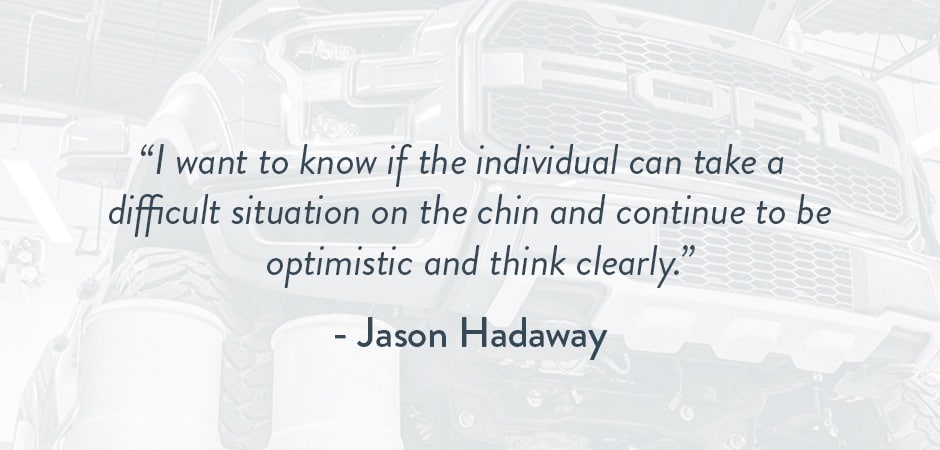
JH: Communication is also a vital characteristic in a well running firm. As Leaders, our ability to communicate up and down, while also keeping the Team communicating clearly and professionally on a daily basis is an enduring task that requires constant effort. Doing this effectively allows our employees to understand their working environment, and give them confidence that their leadership and supporting assets are delivering on their tasks. It forms a bond between all stakeholders that produces an environment of trust and confidence. At National speed we focus on delivering a clear mission and end state, a thorough understanding of the lateral limitations, and a deep rooted “why”..An equal focus which is the primary driver in any successful Team culture are the people. Taking care of your team members by focusing on their ability to not only do their job well, but to actually ENJOY their job and everyday life. When people are happy, they work harder PERIOD. National Speed continues to push a focus on all key areas of the company by taking direct feedback and putting new plans in place that will help solve issues faster and create the least amount of stress possible on our employees. A company’s success will never be felt unless it is felt by every member of the Team.
Q6 What question are you asked more than any other?
WM: “How did you end up at National Speed?” Networking is what opened the door to the opportunity but making the decision to pursue the VP of Operations position for National Speed was driven by my priorities – location, team culture, variety of problem-sets and daily schedule (fear of “The Groundhog Day” effect), leadership scope of responsibilities, and autonomy. It took about 30 minutes in National Speed’s Wilmington, NC Shop for me to feel confident that I found the Team and professional opportunity that was the right “fit.”
JH: The question I hear most often from Veterans transitioning into the civilian market is “How did you decide which role and industry you would seek after getting out of the military?” I learned two very important things during my active-duty service. Enjoying what I am doing and who I am doing it with are more important than any of the other characteristics of a job such as “working from home.” I spend more time with my work Team than I do with my own children. So, it is highly important I find what I am doing as interesting. Being in an environment that is conducive for personal growth is also a key factor in fending off complacency after being with a company long term. A company that doesn’t conduct performance reviews to give you credible feedback should be a key indicator that they main focus is your job being done well, and less about creating an individual who will not only perform their job well but grow into a person who will impact future innovation and growth within the company.
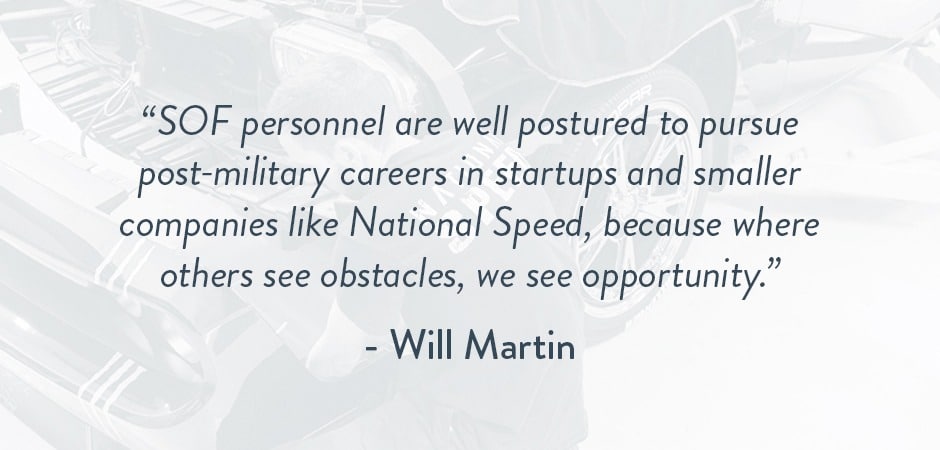
Q7 What drives you every day?
WM: The excitement and challenge of doing something in an industry that’s never been done before – making the automotive performance experience accessible to all. My goal every day is to make my teammates’ jobs more enjoyable and easier to execute, while improving the service, product, and experience that we strive to deliver to our customers. The level of autonomy, creativity, and ability to affect meaningful change has instilled within me a sense of purpose that I was concerned I’d have trouble finding outside of the military.
JH: The success of everyone around me. Not only my wife and children, but the Team I work with every day. Seeing those around me grow professionally and create more opportunities for themselves and their families keeps my striving to provide them my maximum effort each and every day. Being looked to for guidance and assistance from my tribe keeps me hungry to grow myself and provide value to them. Being successful at positively influencing those around you and leaving people remembering you as positive force will consequently result in a successful career for yourself.
Q8 What book do you find most valuable?
WM: I love “Legacy” by James Kerr and have had all my assigned team members and new hires read it. It does an incredible job articulating how the fundamentals of healthy team culture and leadership principles transcend industries and organizations. In support of our Core Values, I’ve tried to develop a foundation, specifically within the Operations Department, that promotes humility, work ethic, professionalism, innovation, and care for each other.
JH: As I get older, I find myself more and more susceptible to forming bad habits that impede my ability to achieve my goals. Therefore, I always fall back on one book I continue to reference for myself and recommend to others for the impact it has had on me. The Power of Habit by Charles Duhigg breaks down the biological and psychological nature of decision making and habit forming. It scientifically explains why habits are formed and how we can change them. The book will give you a fresh understanding of human nature and how we can trick ourselves into forming habits that will positively influence our everyday lives. As I continue to grow as a father, professional, and a friend, I find that it is the finer details of my day that can be tweaked in order to optimize my performance. Whether its waking up at a certain time, making it to the gym, or remembering to have a positive attitude throughout the day. This book helps with getting you there.
Q9 What is a lesson you learned the hard way?
WM: Within my first 3 weeks of working at National Speed, I had a stern conversation with one of my Direct Reports, which ended up not being as productive as intended and resulted in him in tears. I’m not going to go into the details, but my takeaway from that experience was that the transition continues well after you accept a job outside of the military. I’ve had some adjustments to make on my end regarding how I communicated with and managed team members that aren’t Navy SEALs. Personal and professional growth is perpetual.
JH: We are a product of our environment. We form habits and ideas from our exposure to different people and places. Therefore, to continue to grow and be successful it is vitally important that I continue to work hard, surround myself with people that genuinely care for my well-being, and to value my families and my own happiness. Above all else. In short, love what you’re doing and who you’re doing it with, and the rest will fall into place!
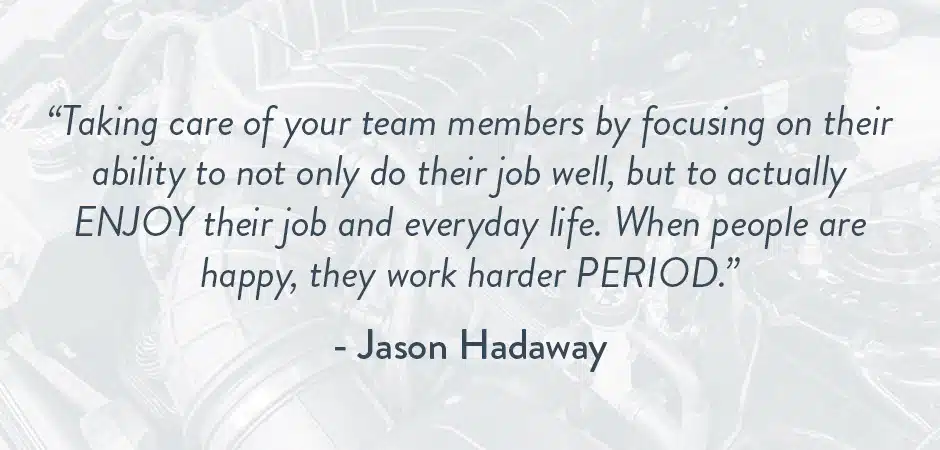
Q10 What defines a leader?
WM: Your Team’s morale, drive, and success in the face of adversity is what ultimately defines your efficacy as a Leader. Furthermore, I firmly believe that it is critical for a leader to actively seek feedback and opportunities to clear the brush for their teammates to make the job easier and more enjoyable, while fostering a healthy work life balance for all – simplified, sustainable, predictable, and easy replicate operations. People don’t know you care, until you show you care.
JH: A Leader is someone who can effectively communicate a task or mission to other people and instill confidence that there is an effective way to accomplish said task, while also convincing those of the value in succeeding. A great Leader is someone that can effectively perform that function and personally guide their Team through the entire process. This is done by focusing on each individual within the Team. Also having a thorough understanding of the necessary knowledge and processes, and having a real passion for delivering a product or service that will strengthen your Team or companies’ reputation.
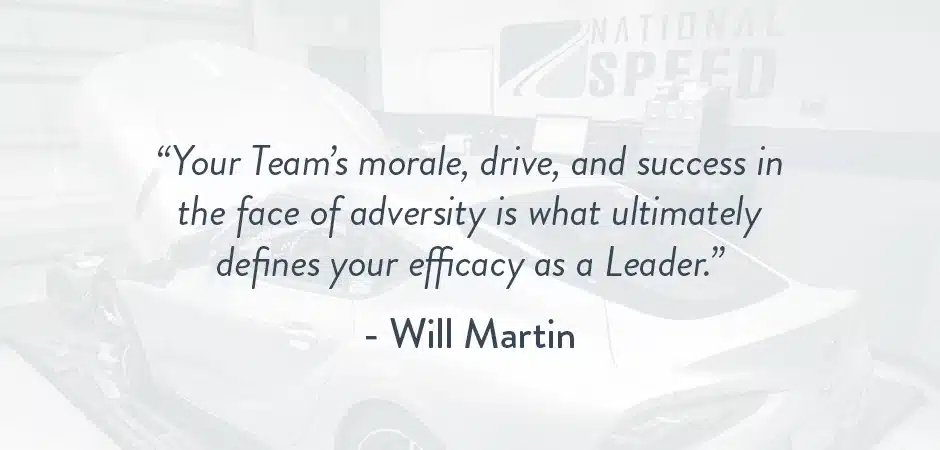
Q11 What is your favorite quote?
WM: “Get busy living or get busy dying.” -Andy Dufresne
JH: My favorite quote is something my grandmother has said to me throughout every difficult task I have taken on in life. When I used to complain about schoolwork in college, her response “This to shall pass” always irritated me in its simplistic and obvious nature. When I spoke with her during basic infantry training and told her of my blistered feet, she again told me “This to shall pass.” I was able to hear my Grandmother repeat this during ITC when becoming a Marine Raider, during long deployments where only coming home was my greatest desire, and lastly when I was transitioning out of the military and experiencing the crippling stress and anxiety of figuring out my “why” and what adventure I would take next. Ever greater achievement the more weight those words continue to have for me. She passed on last year, and her words will continue to resonate for me during each difficult thing I choose to pursue next.
Q12 National Speed, what unanticipated skills, talent, and/or competencies did you gain for employing Special Operators at your organization?
National Speed: Brilliance in the basics. Never feeling overconfident that I have everything right, or fully understand everything. These characteristics keep me humble and always looking to grow. As a Leader, I have others that rely on me to guide them when things are tough. To drive clear communication and help come up with new ideas to solve fresh problems. So, my most important lesson from all the of successes and many failures as a Special Operator; Never think you have it all figured out. Continue to prepare and plan for as many unknowns as possible, and always put your best efforts into anything you choose to pursue.
